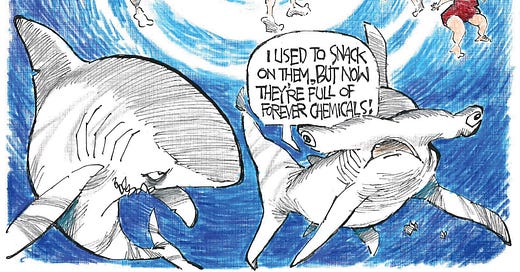Recycling Myths Promote Pollution
With April 22 as Earth Day, television network morning shows that week interspersed their Big Pharma commercial campaign with info and tips of ecological significance – some segments helpful, others not so much.
On Monday ABC meteorologist Ginger Zee greeted viewers from an Earthship rental in northern New Mexico. Stuffed tire adobe construction, solar panels, indoor greenhouse, water recycled four times through the structure. The structure? About 5,000 square feet sitting on what looked to be a few acres, costing about $400,000 though that sounds low to me – though too high for me at the same time.
OK, let’s start converting American cities and towns.
Other info was more useful. Later in the week, Zee informed us that most of the clothing [about 85%] we donate to truly do-gooding organizations end up in landfills, often in landfills across the world.
Her ABC News pals had earlier put tracking devices in 46 plastic bags they deposited in recycling bins at Walmart and Target. Their conclusion:
“Only four trackers last pinged from a U.S. facility that said it was involved in plastic bag recycling. However, subsequent public records requests and additional research have revealed that all four of these facilities likely either trashed the plastic bags in the U.S. or exported them abroad, though none of the facilities would divulge to ABC News specifically where the bags were sent.”
Two “recycled” plastic bags made it to trash heaps in Malaysia, another to Indonesia. So, not only was there no recycling, but polluting energy was used to ship the trash elsewhere. How much?
ABC reports: “Since 2020, more than 600,000 metric tons of plastic waste has been shipped from U.S. ports to countries around the world under the premise of "recycling." It cited data provided by S&P Global Market Intelligence.
We had a recycling program in Duncan for several years. [I felt righteous!] It was discontinued when the recycler said that it was not economically feasible. Apparently, it never has been.
There are those who say my era of good feeling was the intended result of a calculated campaign by the petrochemical industry which knew that plastic recycling was impractical, but, knew, too, that it was profiting from the pollution.
In February, the Center for Climate Integrity issued a report – The Fraud of Plastic Recycling – that contended: “Between 1950 and 2015, over 90% of plastics were land-filled, incinerated, or leaked into the environment. Plastic waste is ubiquitous—from our rivers, lakes, and oceans to roadways and coastlines. It is in ‘the air we breathe, the food we eat, and the water we drink.’ One study estimates that humans ingest up to five grams or the equivalent of one credit card worth of plastic per week.”
Plastics and microplastics are major components of the Great Pacific Garbage Patch – about twice the size of Texas – that swirls off the coast of South America.
We have seen those feel-good recycling ads about the little plastic bottle that becomes a welcoming park bench. Evidently there is an ulterior motive there – “a decades-long campaign of fraud and deception about the recyclability of plastics,” according to CCI.
“Despite their long-standing knowledge that recycling plastic is neither technically nor economically viable,” the report says, ”petrochemical companies – independently and through their industry trade associations and front groups – have engaged in fraudulent marketing and public education campaigns designed to mislead the public about the viability of plastic recycling as a solution to plastic waste.”
Oh, yeah. Some of these companies are the same ones who knew the dangers fossil fuels posed to the global climate 40 years ago and provided disinformation and paid politicians to keep their profits rolling in.
CCI says that those perpetuating this “campaign of deception” should be “held liable for their coordinated campaign of deception and the resulting harms that communities are now facing.”
I figure I’ll be moving into Earthship Edmondson about the same time the greedhead polluters are made to pay for the Earth-wide desolation they perpetuate.






